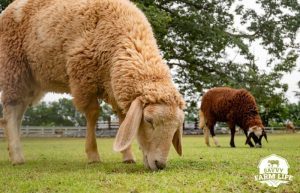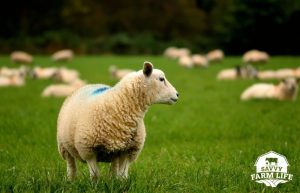
Reasons Your Sheep May Not Be Eating
Since animals can’t physically talk, it can be difficult to tell when something is wrong with them. I find that sheep can be especially stoic when they are facing a health problem. One sure sign that something is amiss, however, is if your sheep stops eating. Anytime an animal stops eating, there is reason to be concerned.
Why is my sheep not eating? There are many reasons your sheep may not be eating. Here is the list of why your sheep may not be eating:
- the sheep may have eaten something toxic
- the sheep has a mouth injury
- the sheep may be ill
- the sheep is dealing with a bacterial, viral, or parasitic infection
Read on for other signs to look for when trying to diagnose the reason behind the loss of appetite.
What to Do If Your Sheep Isn’t Eating
If your sheep isn’t eating, it’s important to find the cause. If you notice this behavior in your sheep, here are some things you can do to diagnose the problem:
Checking Your Sheep’s Feed
Sheep, like goats, will not eat wet or spoiled hay. If your sheep is not eating, check your feed to make sure it is dry and mold-free. If the feed looks good, smells fine, and your other sheep are eating normally, the problem is likely not the feed.
Checking Your Sheep’s Pasture
Does your sheep have access to any toxic plants in the pasture? One reason your sheep may not be eating is because they may have eaten something poisonous. Aside from loss of appetite, other symptoms of toxicity may include lethargy, bloating, and drinking excessive amounts of water.
Check your pasture for plants that are toxic to livestock, including but not limited to: flax, milkweed, black locust, St. John’s wort, lambsquarters, bracken fern and pokeweed. Landscaping plants that are toxic to sheep include but are not limited to: lantana, iris, holly, morning glory, yew, oleander, wild cherry, mountain laurel, rhubarb, oak, and cruciferous vegetables. Contact your vet immediately if you suspect your sheep is suffering from plant toxicity.
To learn more about what your sheep can and can’t eat, visit my article Sheep Treats 101: Treats You Can Safely Feed to Sheep.
Check Your Sheep’s Mouth
If your sheep has oral pain, they will likely not be eating in an attempt to avoid the pain. Try to open your sheep’s mouth so that you can get a good look inside. Do you notice any injuries to the inside of the mouth, jaw, or around her face? Do you notice any lesions or sores inside of the roof of her mouth, tongue, or anywhere else inside the mouth? Pain in the mouth can be anything from a thorn that is stuck, an injury caused by another sheep, an infection, or cancer. If you suspect pain and cannot find the source of the pain, contact your veterinarian for a more thorough oral exam and possibly sedation.
Check Your Sheep For Bloat
 A sheep suffering from bloat may present with loss of appetite. Other symptoms to watch out for in diagnosing bloat may be a distended abdomen (on the left side), and/or a sheep that is lying on its side and is reluctant to stand up. A bloated sheep may also moan, kick at his belly and fidget, and experience respiratory issues.
A sheep suffering from bloat may present with loss of appetite. Other symptoms to watch out for in diagnosing bloat may be a distended abdomen (on the left side), and/or a sheep that is lying on its side and is reluctant to stand up. A bloated sheep may also moan, kick at his belly and fidget, and experience respiratory issues.
Bloat can usually be treated by intravenous fluids, milk of magnesia, or simply the passing of time. Call your veterinarian to determine the best treatment for your sheep. Even better than treating bloat, however, is preventing bloat. The most common causes of bloat in sheep are over-eating grain, and diet changes – including over-eating during seasonal pasture changes.
Check Your Sheep’s Health
A sheep may experience loss of appetite due to a bacterial, viral, or parasitic infection. These are more difficult to diagnose on your own, and you will likely need assistance from a veterinarian. It is important to note any other symptoms that may reveal what is making your sheep sick, including digestive upset, fever, and other viral symptoms.
Sheep Fever
The best way to monitor your sheep’s internal body temperature is with a rectal thermometer. A normal sheep temperature should be in the range of 100.9 degrees and 103.8 degrees fahrenheit. Anything higher than this 103.8 is considered a fever and could be an indication of an infection. Don’t have a thermometer? Try feeling your sheep’s ears – if your sheep has a fever, his ears will likely be warm to the touch, just as a human’s forehead would feel hot.
Sheep’s Urination
Is your sheep straining to urinate? In male sheep especially, this is not normal and can indicate a blockage in the urinary tract. Symptoms of a urinary blockage include loss of appetite, groaning in pain, and struggling to urinate. This is a problem most commonly seen in males – particularly castrated males. A blockage can cause significant pain and should be treated as quickly as possible.
Sheep’s Stool
One important diagnostic tool is to check your sheep’s stool. Is it runny and foul-smelling? Is it drier than normal? In livestock, diarrhea is called “scours”, and it is helpful to take a sample of the scours to your vet for testing. Scours can indicate anything from a bacterial infection to parasites. Below are some common causes for scours that may also accompany loss of appetite:
Coccidiosis – Coccidiosis is a common protozoan parasitic disease and more likely to affect lambs than adult sheep. If coccidiosis is confirmed, it is a good idea to treat the entire flock of sheep as there is likely an outbreak. Treatment consists of supportive care, in addition to medication that is applied to the sheep’s feed which acts to stunt the growth of the parasite’s life cycle until immunity is achieved.
Worms – Worms are another common cause of scours and general malaise, and for this reason most keepers of sheep de-worm their flock on a regular basis, and vaccinate annually. Worms can be treated with a general de-wormer. If the infection does not resolve, you can bring a fecal sample to your vet to diagnose the specific type of worm infestation.
E. Coli – E. Coli is a common bacterial infection affecting sheep, especially in young lambs. E. Coli can be treated with antibiotics and supportive care.
Clostridium perfringins – Clostridium perfringins types A, B, C, and D can all cause illness in sheep. These are food-borne bacterial infections. Depending on the type of infection, you may be able to treat it with supportive care and an antitoxin. These diseases are preventable with an annual vaccine.
Other Sheep Viral Symptoms
Pneumonia is another common disease sheep can become afflicted with. Aside from fever and loss of appetite, a sheep with pneumonia may be lethargic and have trouble breathing, and may have thick nasal discharge. While there are no pharmaceutical treatments for viral pneumonia, a vet may recommend antibiotics to prevent a secondary bacterial infection. Supportive care is important in treating a sheep with viral pneumonia.
Another sign that your sheep may be sick or in pain is that they will bleat frequently. To learn more about this behavior, visit my article Why Sheep Bleat: Essential Behavior Guide.
When To Call The Vet
Of course, if you are concerned about your sheep’s health and cannot find the cause behind the symptoms, it is important to call a veterinarian for guidance. If your sheep has not eaten in 48 hours, or the loss of appetite is accompanying other concerning symptoms, you should call your vet and request a visit. Catching a potentially life-threatening problem early will save you money in the long run, and can save your sheep’s life.
Common Sheep Home Remedies
You may want to try a few home remedies for a sheep that is not feeling well before reaching out to the vet. There are a few remedies that many sheep farmers rely on, including:
De-Wormers – if you have a flock of sheep, you likely already have de-wormers on hand. You may want to try to de-worm a sheep who is ill and/or not eating to see if this helps. At the very least, it cannot hurt to de-worm.
Vitamin B12 – sheep can become deficient in B12, and B12 can also help a sheep recover from periods of illness. You can administer B12 to your sheep either with an injection, or in liquid form. This is another treatment that is worth a try, and at the least, will not cause any harm.
Antibiotics – livestock antibiotics can usually be purchased online or through your local feed store. While it is not a good idea to overuse antibiotics, you may choose to try a broad-spectrum antibiotic on a sheep that is not feeling well.
Baking Soda – baking soda can be an effective treatment for a sheep experiencing bloat from acidosis (overeating grain). Surprisingly, a sheep experiencing bloat will often ingest baking soda if offered free-choice.
Pepto-Bismol – if your sheep is experiencing diarrhea, pepto-bismol is an effective treatment. Contact your vet for the appropriate dosage.
Beer – yes, beer. A sheep who will not eat will affect the rumen – and an unhealthy rumen will in turn lead to loss of appetite. Many keepers have discovered that treating an ill sheep with beer will give a boost to the rumen and allow the sheep to recover on its own. If you are treating an adult sheep with beer, you may try ½ can of beer in the morning, and another ½ can in the evening.
When To Call In The Professionals
Unless there is oral pain in the sheep that must be addressed, a sheep that is not eating usually indicates a sheep is not feeling well. While you may choose to attempt home remedies and supportive care in the beginning, it is important to reach out to a veterinarian if your sheep is not improving, or is getting worse. Early veterinary treatment may mean the difference between a recovered sheep and a lost sheep.
Being able to understand sheep behavior is just one way you can better care for them. To get a complete overview of sheep behavior, visit my website Sheep Behavior: Ultimate Sheep Behavior Guide.
